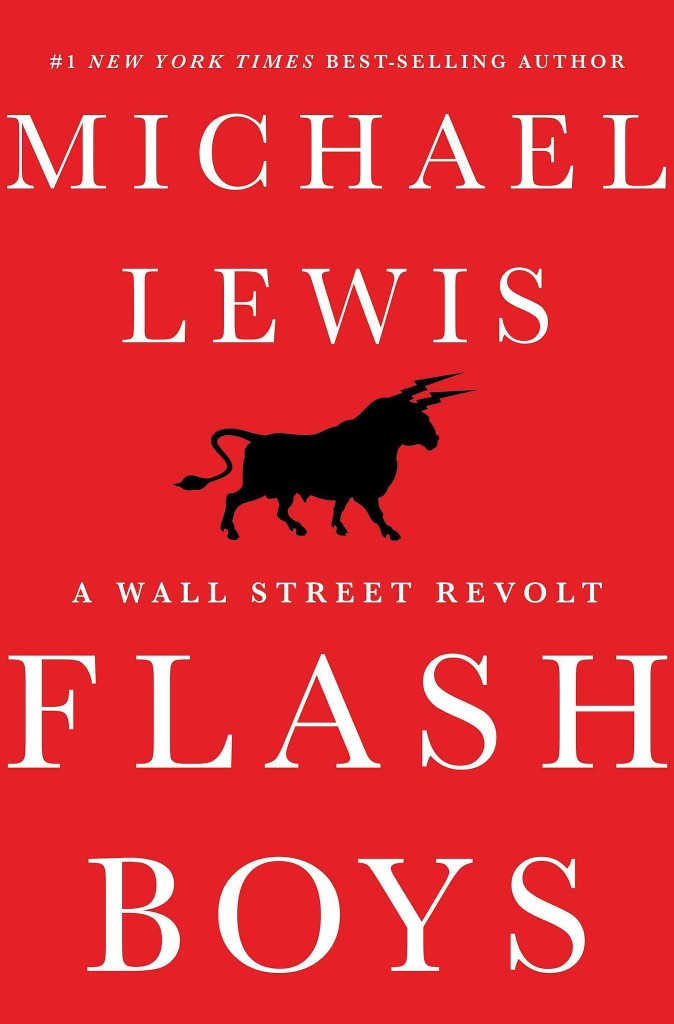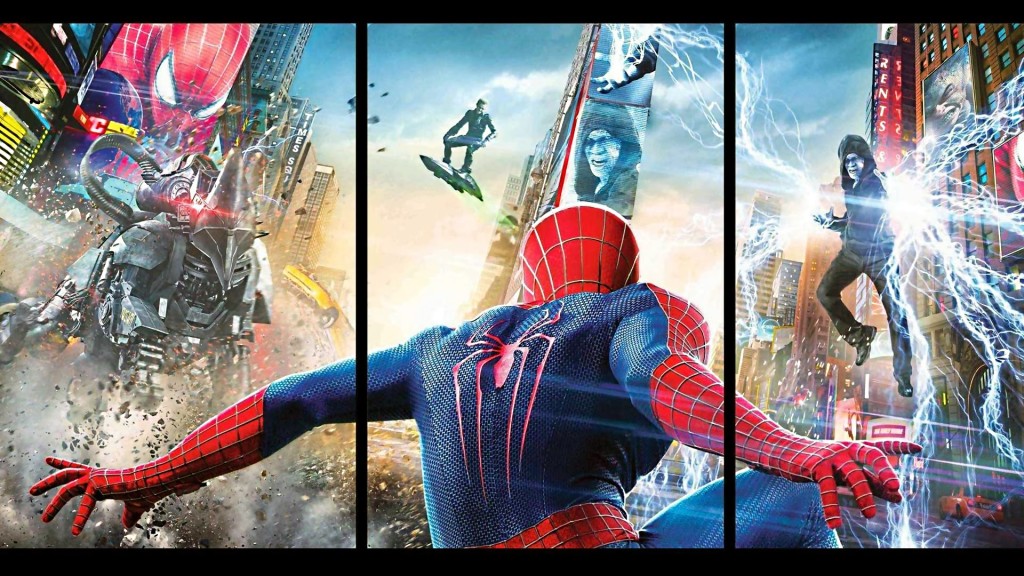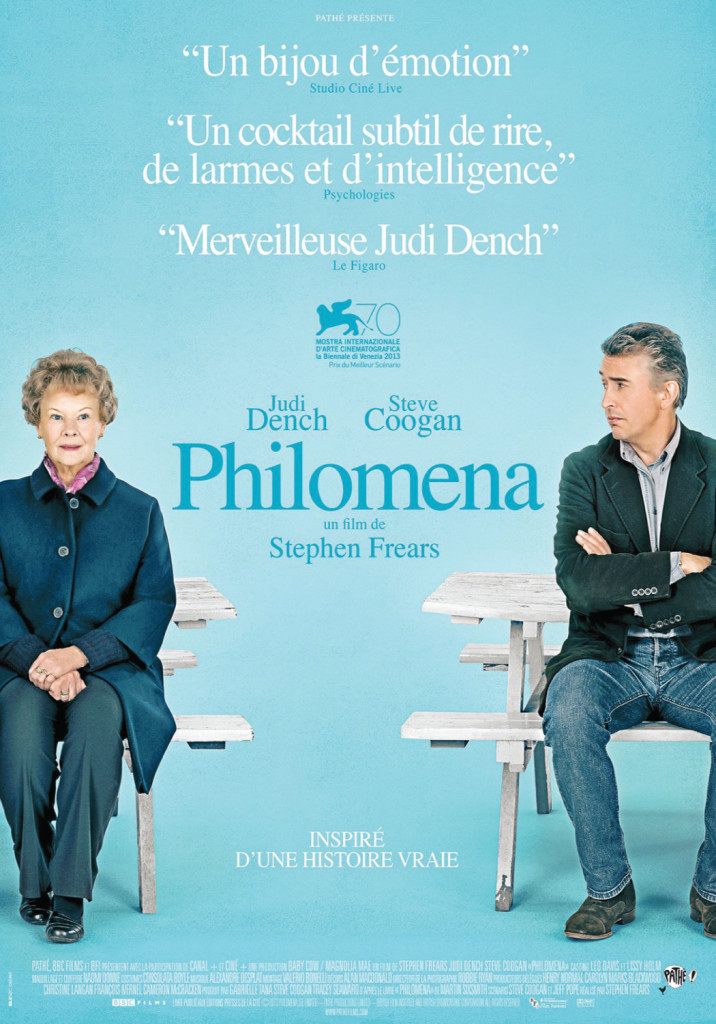Genre: Non-Fiction Book
Premise: A group of Wall Street underdogs begin to realize that the current computer-driven stock market is rigged, and decide to do something to change it.
About: Everyone in town takes notice when Scott Rudin options something, because Scott Rudin wins Oscars. He’s the guy who headed up The Social Network, after all. So when he snatched up Michael Lewis’s best-selling non-fiction book, Flash Boys, the book immediately hit everyone’s radar. You probably know Lewis best for writing the book Moneyball, which, of course, eventually became the movie starring Brad Pitt. You can find Flash Boys here (and as long as you’re over at Amazon, you should pick up my book too. It’s only $4.99!).
Writer: Michael Lewis
Details: 289 pages (published March 31, 2014)
We’re going to do something a little different today. Once that glorious moment comes when you break into Hollywood (through a spec sale or just by writing a great script), your ability to stay in the club will depend on your ability to land assignments. You’ll have to read books like Flash Boys, then come in and pitch your take to producers.
You’ll be up against lots of other writers, so your pitch is going to have to be good. And when I say, “pitch,” I don’t mean your showmanship ability. That’s important, of course. But what’s more important is your take. How do you plan to tell the story?
Because the reality is, a lot of things you’ll need to pitch won’t be obvious stories. They won’t have that perfect narrative spine of a main character going after something and encountering obstacles along the way. In those cases, you’ll need to find a spine. Or decide if you even want a spine. Maybe you want to try something different? The Social Network, the way it bounced back and forth between the deposition and genesis of Facebook, wasn’t a straight-forward treatment of a story at all.
Take Flash Boys. While the characters eventually do come up with a goal, it isn’t until much later. At first, this book is all about numbers and equations and stocks and how stock exchanges work and individual stories of how this rag-tag team of men came together to fight the power. Then, it’s almost like Lewis realized, “Oh yeah, I have to bring this all together,” and came up with something for the group to do.
Flash Boys actually starts with the most fascinating story in the book. A man is secretly building a fiber optic line between Chicago and New Jersey (where the major stock exchanges in the country are located). But this isn’t any ordinary line. He needs it to be straight. Like perfectly straight.
You see, in recent years, trading stocks has become a game of speed. How much speed? The kind of speed where if you can gain at least 1 millisecond over your competitor, it could be worth hundreds of millions of dollars. How is that even possible? That’s what much of the book is about.
But anyway, what this guy realized, was that the current fiber optic line that travels between New Jersey and Chicago zig-zagged all over the place. He hypothesized, that if he could build a straight line, he could save stock traders up to 7 milliseconds of time, which would allow them a huge advantage over their competition.
So his plan was to build this secret line, then go to all the biggest banks and mutual funds and traders, and basically hold them hostage. He’d tell them that if they didn’t get on this line, their competition was going to smash them. Everyone would have to join, and he’d be able to set the price. What would that price be? 10 million each. And guess what? They all signed up.
If there’s a hero in this story, it’s probably Brad Katsuyama. Brad worked for the biggest bank in all of Canada, but when his bank opened a branch in New York, which he’d eventually move to, he realized that nobody gave a shit. On Wall Street, the biggest bank in Canada was the equivalent of a hot dog stand outside of Mcdonalds.
Brad’s new branch meant the company needed a new trading operating system, one that could compete with the heavy hitters on Wall Street. But while Brad expected this new system to make his work easier, it actually did anything but.
Brad realized that whenever he made a trade on this new system, everything in the market would immediately change. Prices in that stock would shoot up or shoot down instantaneously, making it impossible to track the market on any sort of consistent level. In short, every time Brad would make a trade, chaos would ensue.
And he learned he wasn’t alone. When he’d go to other companies, he found that the same thing was happening to them. The crazy thing was, nobody knew why it was happening. Everyone just assumed that because technology was increasing at such a rapid rate, chaos was the collateral damage.
But Brad wasn’t so sure. He thought something fishy was going on. So he went to all the guys at all the top banks and all the top firms, asking them what they thought was going on. But nobody had a clue. What confused Brad is that nobody was that concerned about it either. Something nefarious was clearly going on inside the biggest financial machine in the world, and everyone either didn’t care or didn’t want to spend the time trying to figure it out.
Finally, Brad figured it out. The problem was High Frequency Traders. Now the book gets REALLY specific about what these guys do, which is super complicated, but I’ll try to simplify. Basically, these lone shark dudes figured out a way to see when one of these huge banks or companies was making a trade, then would zip in and buy or sell in order to profit off of it. They could make millions a day doing this. And every time they took that money, it meant the banks and hedge funds were losing it. And whose money do the banks and hedge funds use? YOUR money. So these guys were stealing from YOU.
How did they do it? SPEED. A bank may buy tens of thousands of shares of stock in one go. That takes time. And by time I mean seconds. But if a high frequency trader (HFT) has access to one of those connections that can make a trade in 7 milliseconds, they can buy and sell stocks before your order has even finished going through.
This is why speed became such an important commodity on Wall Street. Whoever had the fastest connection, even if it was by just .1 millisecond, they could undercut you. So HFT were willing to pay millions for those milliseconds.
Awhile back, you’d hear stories about how traders would have their routers set up in the building right next to the Exchange that made all the trades. This allowed them to make their trades the fastest. Savvy entrepreneurs figured this out, would buy up these adjacent buildings and sell router space INSIDE the rooms in the buildings.
But even that wasn’t enough after awhile. Traders would start paying money to get preferred placement INSIDE the room. They wanted their routers to be right next to the wall, so they were closest to the trading building across the street. Even if it was just .1 microseconds of an advantage, it was an advantage.
The book covers how Brad figured all this out, along with his campaign for trying to explain to Wall Street how badly they were getting screwed. Nobody believed him though because nobody on Wall Street gives you information for free. They erroneously figured he must be trying to scam them. Nobody just tells you how to save money. They use that information to MAKE money. They didn’t realize that Brad was just Canadian.
After his knowledge campaign failed, Brad decided to do something unprecedented. He recruited a bunch of underdogs that Wall Street had spit out, and decided to create a new stock exchange. This exchange would have a built-in algorithm that would make it impossible for high frequency traders to game the system. Everybody who traded through his exchange would be on equal footing.
Of course, creating your own stock exchange was nuts to say the least. Up until a few years ago, there were only a couple (the NYSE and the Nasdaq). Some deregulation practice to increase competition came about after the 2008 finanical meltdown. But getting folks to trade on a new exchange was a whole other animal. Would Brad and his buddies be able to do it? That would become the ultimate question.
Flash Boys is a fascinating book that both flies and stumbles in equal parts. When it’s telling stories about people trying crazy never-before-attempted schemes like creating your own stock exchange or secretly building a straight fiber optic line from New Jersey to Chicago (physically blowing up mountains in the process), it’s at its best.
But when it gets into the specifics of how high frequency traders are undercutting the bigger guys, the information is overwhelming. You have to understand how stocks are traded, the unique kind of orders traders can use (which there are a lot of), how “baiting” works, how using different stock exchanges affects a trade, how orders are put through (some all at once, some in bunches), mutual funds, dark pools. Flash Boys spends a lot of time on that. And at a certain point, it’s impossible to keep up.
Still, I found it fascinating. For example, you might wonder why the SEC hasn’t stopped this. It’s because THEY DON’T UNDERSTAND IT. The top people at all the banks don’t even understand what’s going on. These are people who grew up in a pre-computer-stock-driven world. They don’t understand how a bunch of smart tech geeks could sneak in and take advantage of their system (many of them from Russia, surprisingly).
The question is, how do you adapt this into a movie? There’s a lot of information in this book so there’s a lot of different ways to go. When you adapt something, you’re first looking for the best angle to tell the story from, and from there, you’re looking at all the potential challenges that direction poses and how you’ll address them.
So for example, the most obvious angle to tell the story from is to follow five Wall Street misfits as they try to create their own stock exchange. The question is, where do you start? Do you start with them already together? That allows us to jump right into the story. Or do you start earlier and focus on these guys as they meet each other one by one? Because in the book, Brad’s the one who figures all this out before he hires anyone. And the audience needs that information to understand why they’re doing what they’re doing in the first place. So do you cheat, start with everyone together, and have them learn all this stuff together (instead of Brad doing it alone?) or do you follow Brad first, even though that means it’ll take awhile for the story to get going?
Or do you come in with a weirder more ambitious take? Maybe you pull a Lost-style setup mixed with a little Scorsese. Start with these guys already together, have one of the characters be a narrator, then as they pursue their goal of a stock exchange, one by one jump back in time and tell the origin story of each player. Because each guy’s backstory in the book is pretty interesting (one guy realized he wanted to do this after going to work one day only to watch the two towers fall right before going inside).
Whichever way you choose, you’re going to have challenges. For example, Lewis portrays all these guys as underdog Robin Hoods. Their “thing” is that they could profit off this, but instead try to educate others on it. When nobody listens, they build a stock exchange to save them.
That’s very noble and all, but it seems to me that if you build a successful stock exchange, you’re going to make a lot of money. I mean, these guys aren’t donating all their profits to charity, are they? Lewis conveniently downplays this aspect, but it’s something you’d have to consider when adapting the script. You can’t portray people as Robin Hoods if the end goal is to make a ton of cash. And if that – the most obvious direction for the script – can’t be executed, then what’s the end goal going to be? There’s no obvious substitution, yet there is no script unless you find the answer.
And then there’s all that information you have to convey to the audience. Talking about numbers and teaching people how stocks are traded, for the most part, is boring. Yet it’s essential to understand what Brad’s getting so upset about and what he’s trying to do to change it. A smart producer may even ask you that in your meeting. “How do you plan to convey all this information to the audience in an entertaining way?” And you better have an answer ready.
In the end, this is a really good book. Whether it becomes a really good movie is still up in the air. That could be up to you. In fact, maybe Mr. Rudin is watching right now (I know he’s been to the site). Pitch your best take on how you’d adapt the book. Most upvotes wins!
[ ] what the hell did I just read?
[ ] wasn’t for me
[xx] worth the read
[ ] impressive
[ ] genius
What I learned: When it comes to adapting a book, you very well might pick only a small portion of the book to base the script on. It could total only ¼ of the story. The story that opens Flash Boys, for example, could make a great movie in itself (a guy risks everything by building a high speed fiber optic line between Chicago and New Jersey with no idea if anyone will actually buy into it when he’s finished). All you care about when adapting something is finding the best story within those pages and bringing it to life. What makes a book good often isn’t the same thing that makes a movie good.
Genre: TV Pilot – Drama
Premise: Set in Boston in the 60s, a squeaky clean FBI officer is asked to turn an underdog Irish gangster into an informant in an attempt to take down the Italian mafia.
About: This was a huge project coming out of Fox, as it was to be directed by Ben Affleck (you know, the whole Boston connection thing). But the reality was that after Argo won the Oscar, Ben became overcommitted. Then the whole Batman thing happened and he was really overcommitted. Doesn’t Ben realize that every time he leaves a project, he destroys a writer’s dream? Glenn Gordon Caron has a few nice credits under his belt (Moonlighting, Medium), but this was a potential career-maker. It would’ve taken him to another level. Ahh, Hollywood. Timing is everything.
Writer: Glenn Gordon Caron
Details: 56 pages – Revised First Draft (8/26/13)
I go into these scripts with a prejudice. I can’t help it. It’s much the same prejudice I go into a romantic comedy with. Which is that I know it’s probably going to be the same old song and dance. There’s going to be a tough sounding Jersey-accented voice over guy. There’ll be several scenes where the local mob offers to “protect” folks. There will be dirty cops. Some snazzy-dressed gangster is going enjoy his meal at the best table in the best restaurant in town. It’s like everybody who’s ever seen Goodfellas wants to show you that they can write Goodfellas too.
Except I don’t want to see Goodfellas again. I already saw Goodfellas. I want something new. And this is what every writer needs to tattoo backwards to their forehead (so they can read it in the mirror, of course) – you gotta give us something different. You can’t come in with the same old angle and expect us to care.
So color me surprised when, ten lines into that expected voice over, our narrator informed us that he was nine years dead. Hmm, I thought. Haven’t seen that before. Sure, it’s a small thing, but it gave me trust. It helped me know that this writer was actually TRYING as opposed to APEING. Surprise a seasoned reader, that gets you ten more pages easy. And assuming you keep surprising us, we’re along for the whole ride. So how was that ride?
It’s present day when we meet 80-something barely-alive Mickey Flood, who’s been terrorizing Boston for 50 years and finally paying his dues for it in court. We’re learning this from Rudy, our narrator, who tells us he and Mickey used to work together.
The two met when Mickey saved Rudy’s life as a kid, just as a bunch of older kids were getting ready to throw him off a roof. It wasn’t until 20 years later (the 60s), that they met again, with Mickey being a low-rent gangster and the straight-laced Rudy coming home as a member of the FBI.
It just so happened that president Kennedy was enacting a new coda for crime-fighting – converting criminals to informants. And that was Rudy’s first job – to find a criminal and strike up a relationship with him that helped the FBI take down other bad guys. Naturally, Rudy went to his old friend, Mickey, who had no problem giving up tidbits on the Italian mob, since they were technically his competition.
Meanwhile, an entitled businessman named Grayson refuses to pay Mickey back the money he loaned him. Mickey, of course, threatens his life as a result. Grayson doesn’t like some two-bit gangster wannabe telling him what to do, so he goes to the Feds for protection. They tell him if he testifies in court against Mickey, they’ll protect him. Grayson says fine. In the meantime, Rudy is pleading with the FBI to let Mickey be his informant, something they’re not sure they want to do.
But when Mickey tells the cops when the Italians are planning a major supermarket heist, they change their minds. And Mickey gets a little bonus for it. The Feds leave Grayson alone between shifts just long enough for Mickey to squeeze in there and squeeze the life out of the cheating bastard. It’s the beginning of a unique friendship between a criminal and a bureau agent that will last a long time, and shape much of the criminal underworld in Boston.
 “Dude, I said leave me alone. I’m not going to direct your TV show.”
“Dude, I said leave me alone. I’m not going to direct your TV show.”
Like I said, there aren’t too many ways to make this genre different. So how do you do it? Well, you do it with little surprises, like our narrator being dead. That was a nice touch. But I realized that the ultimate goal here isn’t much different from any story. You want to keep them hooked long enough to fall in love with your characters. Because once the reader’s in love with your characters, you got’em for the long haul.
And that’s what happened with me. Mickey Flood is introduced as this despicable human being. Here he is, in court, 85 years old, barely able to breathe, being convicted of dozens of murders, and he’s still able to stand up and call the judge a piece of shit.
I was curious how they were going to get us to care about this guy, but they did it rather simply. Once we flash back, they establish Mickey as an underdog. He wasn’t someone born into this business. He didn’t have the contacts to get him into “the family.” He was considered a cheap pale imitation (literally, as he was Irish) whose name didn’t deserve to be uttered in the same breath as real mobsters.
It’s this disrespect from his peers that helps us forget that asshole in the courtroom and start to sympathize with this guy. It didn’t hurt that he saved our hero from death as a child (an unapologetic save the cat moment if there ever was one). But clearly, we felt that there was more to this guy than your average cliché gangster and we liked that.
Also, when you write these pilots, there are a couple of things you need to pay attention to besides the characters and plot. I’ll get into the second thing in the “What I learned” section, but the big one is that your pilot has to be ABOUT SOMETHING SPECIFIC, particularly if you’re exploring a general area, like crime. Lost and Walking Dead and Breaking Bad all have the unique angles built into their premises, but the criminal underworld of the 60s is still too vague. We need that extra “specific angle” to explore.
Here, it’s informants. We know that because it’s brought up over and over again – how informants are the wave of the future. How the president himself wants the Feds to make them a priority. This is what takes this from being “just another Mob show/flick” to a more specific angle we can explore over the course of the series. This is going to be about the tricky relationship between an FBI agent and his informant.
If you’re not exploring some unique angle in your pilot, chances are it’s going to feel thin. C.S.I. is about the use of unique forensic tech to solve cases. Seinfeld was about the mundane minutia of every day life. What unique angle are you exploring in your TV show?
In the end, this script gets it right. It manages to have a lot going on, yet never to the point where it confuses the story (that’s really hard to do!). It makes you like and care about the key characters. And it feels just different enough from other scripts in the genre to feel fresh. I can totally see why Affleck wanted to do it. Whether we’ll ever see it from another director, however, is a question I can’t answer. That’s the weird thing about the TV world. Once something’s dead, it’s usually dead for good. But this is too good to get thrown in the trash. I think it deserves a shot.
[ ] what the hell did I just read?
[ ] wasn’t for me
[x] worth the read
[ ] impressive
[ ] genius
What I learned: In a TV script (and for the most part, feature scripts as well), you’ll have your “public” plot and your “personal” plot. The public plot here is getting Rudy from San Francisco to Boston so he can meet Mickey again and start their informant relationship. All of that is great, but we won’t care if you haven’t executed your PERSONAL plot. This is the plot taking place in your main character’s personal life. It’s what allows us to get to know him/her on a personal level, and therefore feel close enough to him to care about what he’s doing. In most cases, it’s a romantic or family plotline, with some sort of conflict or drama going on. So here, Rudy’s met this girl, but he’s not ready to take the next step with her, and leaves her behind when he goes back to Boston. She, of course, shows up later, telling him that she’s preggies (how’s that for informing, Rudester!). His world is rocked, and now he must figure out how to deal with this. What the really good writers do, is they find a way to weave these two plotlines together so they feel like one seamless entity. So at the end here, Rudy must go to Mickey for help in regards to his girlfriend’s pregnancy. Mickey strikes a deal with him that helps take care of the pregnancy, while giving him (Mickey) a second life.
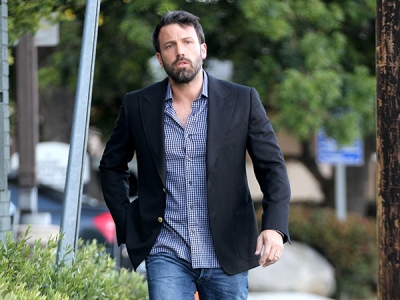 “Okay, that’s it! Do you know who I am? I’m Ben Affleck! I don’t do TV anymore! Got it! What part of ‘two Academy Awards’ don’t you understand? A marriage… needs work. It needs work, okay….”
“Okay, that’s it! Do you know who I am? I’m Ben Affleck! I don’t do TV anymore! Got it! What part of ‘two Academy Awards’ don’t you understand? A marriage… needs work. It needs work, okay….”
You went searching for it, didn’t you? You went on a trek down the internet yellow brick road, through all its dark corridors and unsavory crevices, in search of the return of Mish-Mash Monday. You’d enjoyed it so much the first time, you just had to have more. It was like a moist Betty Crocker yellow cake with that chocolate frosting that’s light enough to float. I’d promised it would be back. So then why? Why did it disappear?
Well I have wonderful news for you, folks. Mish-Mash Monday is back! The special “Huge Screenwriting Advice” Edition. I’ll get more into that later, but first, I wanted to discuss one movie I didn’t see, and one movie I didn’t want to see, all in hopes of understanding this craft a little bit better.
It all starts with Spider-Man 2, a film I’d planned to see this weekend but couldn’t muster up enough enthusiasm to do so. I don’t know what it is about these Spider-Man movies, but if they were Christmas trees, they’d be that strand of lights right around the middle that’s always going dark. And no matter what you do, you can’t fix them.
I don’t know if it’s Andrew Garfield, who looks too tall and goofy to play the part of the web-slinger. I don’t know if the domination of the Marvel super-hero universe has made Spider-Man less relevant? I don’t know if the coolest aspect of Spider-Man (those fun POVs of him flying through New York) has run its course, not unlike Matrix bullet-time? But something’s definitely missing.
One thing that drives me bananas about these films is all the villains. Populating your superhero film with lots of villains so you can sell a bunch more toys is not a new idea. But Spider-Man always seems to go overboard with it. They almost look desperate, like they’re calculating, right there on the screen, that if they don’t have that third or fourth villain, they’re making 15 million less on toy sales and there’s no way they’re okay with that. I remember Sam Raimi complaining about this very problem in his last Spider-Man directing effort.
What the suits don’t realize is that this DOES affect the film. The justification for why a character is in a story is embedded into the very fabric of storytelling. The second a character feels wedged in for reasons other than the story itself, something starts to smell fishy to the audience. As writers, our job is to hypnotize. It’s to make the audience believe in what we’re telling them. And if you start planting things in that don’t make sense, the hypnosis starts to crumble, and before long, they’re no longer under your spell.
I watch these Spider-Man 2 trailers and you have Green Goblin, Rhino, Electro. It feels unfocused, like they’re unsure what the movie is actually about. That’s not to say other famous super-hero movies haven’t done the same. The gold standard for superhero franchises, Batman, had Two-Face and The Joker. But, for the most part, Nolan gave us one villain per Batman film, and he made that villain the star villain.
That’s the other thing. When you focus on one villain, you can actually give them depth. You can make him a worthy adversary to your hero. When there are two or three other guys, we’re only getting the bullet points of each villain. You don’t have enough time to delve into them, and the films feel more surface level as a result. So I’m not surprised to hear that’s a criticism these last three Spider-Man films have faced.
On the flip side of that world is a small movie I saw last week. You know a movie’s good when it doesn’t need pyro-technics or VFX wizards or a half-dozen car chases to keep you entertained. All it needs is people and words. Which is why, so far, Philomena is my favorite film of the year.
For those who haven’t seen the film, it’s about a journalist, Martin, who’s recently lost his job. He somehow gets sucked into a human interest piece about a former nun, Philomena, who was forced to give her baby up for adoption 50 years ago by the nuns at her convent. Philomena wants to find her son and meet him for the first time.
The first thing I loved about this movie was the RESISTANCE they built into the main character pairing. Any time you team up two people to find something (in this case, the woman’s son), you want to create resistance between them (from one, the other, or both), as it adds conflict. It’s not overdone here. This isn’t Ride Along. But Martin isn’t happy that his career has devolved into escorting a rambling senior citizen around the country. It adds such a charming sense of humor to the relationship, that even if there were no story at all, you’d still enjoy watching these two, something every “two-hander” should strive for.
But it was the MYSTERY that got me. I thought this was going to be one of those non-dramatic self-important indie films where two mismatched people drive cross-country and learn something about each other. But it was much more than that. I’ll tell you why.
It coincides with the exact moment I got hooked, which was when Philomena and Martin go back to the convent to ask for the records on her son. The Head Nun is very skittish and borderline rude, almost to the point that she seems like she’s hiding something. Hiding something is ALWAYS good for screenplays. Secrets are what make drama go round.
The nun tells Philomena that all those old documents were destroyed in a fire. There’s nothing they can do. She does, however, locate something Philomena signed a long time ago, where she promised never to go looking for her child. While they’re able to convince an old woman easily, Martin’s not so sure. Curious, he points out, that this ‘great fire’ destroyed every single piece of information that would help Philomena find her child, yet has preserved the one piece of paper that would prevent her from doing so.
I don’t know what it is about this simple set-up: bad people trying to screw over good people, but if you do it right, it’s so damn effective. However, Philomena finds a way to add a turbo boost to that tried-and-true setup, one you, as a screenwriter, should always keep in your bag of tricks as well: IRONY.
If these were, say, big corporate assholes preventing Philomena from finding her son, we’d be upset, but we wouldn’t be surprised. Men like that are expected to act that way. It’s that this a group of NUNS who are doing this that gets us. The people who are supposed to be the most trustworthy are screwing our main character over. That’s what draws us in, that terrible people masked as righteous people are screwing a poor helpless old woman over. That’s why we want to stick around. Irony. Never forget how powerful it can be!
Ahh, but that isn’t the only lesson you’ll learn today. I have one more mish-mash story I’d like to add to today’s post.
Awhile back, I was chatting with a writer whose script I’d read. The script was pretty good, but it had a big problem: It wasn’t marketable. Based on how these movies had done in the past, I didn’t think anybody would go and see it. When I tried to explain this to the writer, he vehemently disagreed. He insisted lots of people would show up. I made my arguments. He made his. Then at some point, we realized that neither of us were going to change each others’ minds, and we moved on.
Many months later, a movie came out that was very similar to this writer’s script. It wasn’t the same idea, but it was the same genre, same tone, same dark main character, same TYPE of story across the board. The movie did poorly at the box office, but I was long past proving my point. It was just something I passively noted.
Not long after, I ran into the writer again. After catching up, I remembered the film and I was curious about what he thought of it. I didn’t bring up any of our previous conversation. I just asked, like you would any movie, “What did you think?”
To my surprise, he replied, “I don’t know, I didn’t see it.” “Didn’t see it?” I thought. What did he mean he didn’t see it? This was the exact kind of script he was trying to sell.
And then it hit me. He didn’t go see it because he wasn’t interested in it. He wasn’t interested IN THE VERY TYPE OF FILM he was writing. I pointed this out to him and at first he was dismissive. He made some comments about how the two plots were different.
But as the night went on, I could see his mind working. Finally, it dawned on him. That movie WAS very similar to his, and he’d never even considered checking it out. If HE, the very writer WRITING these kinds of movies, wasn’t interested in seeing this film, why the hell would he expect the general audience to do so?
It was a valuable lesson to both him and myself: Don’t write a movie that you wouldn’t go see yourself. It seems like the most obvious advice in the world, yet I’m constantly reminded how many writers ignore it. I remember this guy who used to write all these goofy comedies that never quite got the tone right. It occurred to me after awhile that I never saw him actually go to any of these movies. So I asked him one day, “When was the last goofy comedy you actually paid for?” He thought about it for a moment, then conceded he couldn’t remember. Of course you’re not going to get the tone right if you’re not even interested in watching those kinds of films.
Guys, you have to be realistic. If you’re not paying your hard-earned money to see the very types of movies you’re writing, then why would you expect anyone else to? It’s hard to put butts in seats. Hollywood spends billions of dollars to figure out how to do it. But the cheapest research is also the most telling. If your movie can’t even get you to show up, you shouldn’t be writing that movie.
Mish-Mash Monday out!
Get Your Script Reviewed On Scriptshadow!: To submit your script for an Amateur Review, send in a PDF of your script, along with the title, genre, logline, and finally, something interesting about yourself and/or your script that you’d like us to post along with the script if reviewed. Use my submission address please: Carsonreeves3@gmail.com. Remember that your script will be posted. If you’re nervous about the effects of a bad review, feel free to use an alias name and/or title. It’s a good idea to resubmit every couple of weeks so your submission stays near the top.
Genre: Drama/Thriller
Premise (from writer): When a professional contract killer discovers he’s become the target of an assassination himself, he teams up with the would-be killer to figure out who set them up.
Why You Should Read (from writer): Been a screenwriter for a certain number of years, written some amount of screenplays, placed in various categories of various competitions, and done other unspecific things. But why should you read this specific script? I don’t know. Because I think it’s a decent script. Because I’m genuinely curious what kind of bashing Carson gives it. Also, this was a top 10 script in the Industry Insider Competition – Roger Avary round. No, it did not win the coveted honor of first place, but Fargo also lost best picture to The English Patient, so clearly people do make mistakes.
Writer: Matt Williams
Details: 114 pages
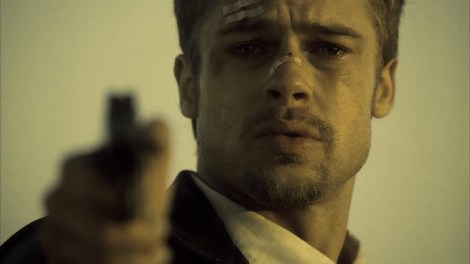 I don’t use Brad Pitt lightly for these posts, but he’d be perfect for this.
I don’t use Brad Pitt lightly for these posts, but he’d be perfect for this.
Ugh. Another hitman script.
In the immortal words of Darth Vader: “NOOOOOOOOOOOOOO-OOOOOOOOO!”
Has there ever been a hitman script that didn’t follow the exact same formula as every other hitman script? A cursory glance through my memory banks says, “Nuh-uh.” And thus I’m stuck eye-muscling my way through yet another generic story with yet another generic outcome.
Unless! Unless, The Savage South locates the hitman-script-miracle-serum and injects itself before it’s too late. Maybe with the help of Kevin Costner? Hey, didn’t I just write an article about positivity yesterday? Shouldn’t I have hope? Shouldn’t I be channeling the sweet-sounding hum of Nutty Australian Lady’s soothing voice? Please, I want more money to show up in my mailbox!
40-something Jeff Hollis is a hitman in New Orleans haunted by his gangster father’s murder of his mother. He works mainly for a group called the Dixie Mafia. And while you’d hope there was something unique about this deep south band of criminals, they’re really no different from any other mafia. They do unsavory things. They make a lot of dirty money. And if someone steps out of line, they call on old Hollis to put a bullet in their cranium.
Except one day, all of that changes. Hollis’s boss, Myron, tells him to make a pick-up for him, a job he doesn’t typically do. When Hollis gets there, he meets Eddie, a pathetic sort who confesses that he’s been sent here to kill Hollis but can’t go through with it. By whom, Hollis asks. Hollis is shocked to learn the trail leads back to the man he trusts the most, his boss and friend, Myron.
So Hollis grabs Eddie and they go to kill Myron. But just as Hollis is about to pull the trigger, Myron asks Hollis why he (Myron) would send the most inadequate hitman in history to kill him? Hollis takes pause. It does seem rather strange. Myron goes on to say it’s because he wanted Hollis to live. He was actually following an order from the leader of the Dixie Mafia, the reclusive Dominic, an order he couldn’t refuse unless he wanted to end up sans life.
So Hollis and Eddie go to find this guy, only to learn that Dominic has sicked the number one hitman in the country on Hollis, a bad motherfucker known as The Irishman. And if that weren’t bad enough, there’s a cop named Kessler who’s chasing Eddie for another murder entirely. In other words, there ain’t a lot of wiggle room in this pursuit.
Along the way, Hollis learns about the elaborate string of secrets and lies that led to his mother’s death, and how they had nothing to do with his father, but rather all point back to Dominic. Problem is, finding this guy is impossible. That is until an unlikely ally joins Hollis at the last second, prepared to help him achieve the justice he deserves.
 More on this picture in a second.
More on this picture in a second.
What the hell. This was really good!
To be honest, I was a little dreary-eyed at first. The script took its time getting started. And that’s its biggest weakness. I eventually realized that all the early scenes are setting up the cast of characters, which eventually pay off. The thing is, I’ve read so many scripts where writers do this only for things NEVER to pay off, that I didn’t trust they would here either. Once I realized this was the real deal, I actually went back and re-read a lot of the early scenes.
The strength of this script is in its incredible plotting. Every piece of information is important. Every twist and turn has a purpose. And every character is in the script for a reason. There were two hook points for me. The first was when Hollis gets set up. That’s when I sat up (literally) and said, “Hmmm, okay, I’m intrigued now,” (around page 27) and the second is when Myron explains to Hollis the much bigger plan going on (around page 60 – the mid-point shift). That’s when I officially said, “Okay, I’m in it now.” I honestly haven’t read a script this well plotted, amateur or pro, in a long time.
In fact, I want to do something today that I don’t usually do. I want to speak directly to the writer, because I feel like if he can fix some of this stuff, he can really have a special script here. So these are the things I felt needed work.
The first act – The opening scene was good. It catches our interest and makes us want to find out who these guys are. But after that, I was bored for 25 pages. I just kept meeting people who didn’t seem important at the time. Hollis kills a man who seems insignificant. Hollis talks to a bunch of people in rooms. Kessler talks to people in rooms as well. I think readers are going to zone out somewhere in the first 30 and start skimming on you. Either move these scenes along faster, condense this section, or make it more entertaining. I don’t know if the scenes need more conflict, a bigger mystery box, more suspense, or what. But I didn’t get hooked until Hollis and Eddie met.
You can do more with Eddie – I think I know what you’re going for here. You’re trying to make Eddie the lovable loser. The guy who we’re hoping we’ll figure his life out. While the backstory with Eddie and his family is good, Eddie is eventually relegated to the “question-asker” character (see Ellen Page in Inception), someone to have around so our main character, Hollis, can bounce exposition off him. I don’t think Eddie needs to be the outrageous comic relief or anything (Kevin Hart), but he needs more personality. He needs to stand out somehow.
The Irishman must be bigger – As I was writing the above plot synopsis, I started writing this line: “The Irishman is a hitman that would make even Quentin Tarantino blush.” But then I realized that wasn’t true. He wasn’t unique enough. Wasn’t big enough. The Irishman is a solid bad guy, but he’s nowhere near as nuts as he could be. You need to think Anton Chigurh territory, maybe not that bizarre but definitely that memorable. This guy slits the throat of a patron who mouthed off to him. That doesn’t even make sense (he’s endangering his mission, since the waitress would’ve tipped off the police on who to look for). I believe you’re capable of writing someone a lot more original.
Kessler – While I understand that Kessler’s cutaway storyline adds a sense of urgency (someone chasing Hollis), I never really believed he was going to be a problem for Hollis. Maybe it’s because of that opening scene, when we see that Hollis clearly has him under control, or maybe it’s because Kessler’s too “light.” That and his scenes aren’t very interesting. You can boil them down to a dozen variations of “Do you know where Hollis is?” Just like Eddie, just like the Irishman, Kessler’s gotta have more shit going on. I don’t know if he needs to be reckless or dirty or unpredictable, but if he’s this perfect polite cop who only exists to give us something to cut away to, I’d rather not see him in the story. We have to make this guy more watchable. (crazy thought: Maybe make him a woman instead? Pitch it to Brad Pitt’s people as a way for Brad and Angelina to work together?)
The Dixie Mafia – Finally, I want to know more about and feel more of the Dixie Mafia. What’s different about these guys? What do they do that other mafias don’t? Find out what’s unique about them and exploit it. Remember that if you’re not exploiting the very things that are different about your story, then what’s the point of including them in the first place? Why not make them the Russian mob or the Italian mob? Do a little research, find out what makes this mob tick, and then slather your story in it. Because that’s one of the reasons I was checking out early. Things felt too generic – like every other hitman/mafia script I’d read.
Matt Williams, thank you for surprising me today. I had a long day (met some great Scriptshadow readers for 3 hours but they tired me out!) and was three-limbs into bed before this nice little gem pulled me back out. It’s not quite there yet, but dammit it could be. This was a cool script, and something that’s certainly worth checking out.
Script link: The Savage South
[ ] what the hell did I just read?
[ ] wasn’t for me
[xx] worth the read
[ ] impressive
[ ] genius
What I learned: Remember that if all the good stuff happens later in your script, you’re probably in trouble. Readers love to start skimming once they get bored. So you gotta grab them from the start and never let go. If you have a heavily plotted script like The Savage South and you need that first act to set up a lot of stuff, that’s fine, but REMEMBER TO MAKE THOSE SCENES ENTERTAINING AS WELL, AND NOT JUST SET-UP. Each scene should be a story in itself that you’re trying to entertain a reader with. If three scenes go by that are all set-up and no entertainment, that’s pretty much it for you. Whether they keep reading or not, the reader has mentally given up on you.
 Would you rather work with this guy…
Would you rather work with this guy…
I feel bad about last week’s negative article. So I wanted to change it up today. Two things happened to me in a matter of hours Tuesday that reminded me of an essential quality all screenwriters must have in order to succeed.
It started when a writer informed me about an article they’d read in The Hollywood Reporter. In it, an anonymous working screenwriter complained that the life of a professional screenwriter, for the most part, sucks. The writer who’d read the article was upset. They said, “I’m working so hard to climb up this mountain, and this is what the end result will be? Misery 90% of the time? Why bother?”
I always get a little down when I hear these stories, and I’ll explain why in a second. But that afternoon, I had a meeting with another writer. For the record, this is a writer who’s had some success, but is nowhere near where he’d liked to be. He had this big smile on his face when I arrived and relayed how excited he was to talk about all the stuff he’d been working on. Before long, he was passionately telling me about all of his projects.
It didn’t even feel like a meeting. It felt like two people who love movies talking about writing them. I left that meeting with a noticeable hop in my step. Nothing earth-shattering happened. But I was happy. Why? The answer is simple. This writer’s overwhelming positivity had rubbed off on me. It had gotten me excited. It made me completely forget about that ridiculous article.
But something much bigger came out of that meeting. I realized how easily negativity can influence a writer’s life, and how quickly it can spread to others.
If that writer I’d met hadn’t been so immediately positive, I probably would’ve brought that negative energy into the meeting, and things would’ve gone very differently. Maybe I would’ve brought up the article, maybe we would’ve spent 30 minutes discussing if we thought it was true (being a professional writer sucks), then when the writer pitched me his ideas, they would’ve been laced with a sense of hopelessness, born out of our incorrect belief that making it was “impossible.” I would’ve left the meeting bummed out, and it would’ve taken me a day or two to get back to being excited about the business.
The thing about writing is that it’s such a lonely endeavor. And because you’re alone a lot of the time, your mind often drifts into the negative. “Can I do it?” “Is it impossible?” The doubts start creeping in. Rumors about how the only people who make it are those with family connections, or how nobody’s buying specs anymore, or how minorities don’t stand a chance, or how you have to live in Los Angeles to succeed.
Pay attention to what I’m about to tell you because it’s an often overlooked but ESSENTIAL component to your success in this business. Ready?
Negativity begets Negativity.
I know how crazy it sounds, but if you believe you’re never going to succeed, you won’t. You just won’t. Because you’ve already decided that you won’t. You’re just waiting for the official confirmation.
If you believe you’re going to succeed, you’ve got a chance. Because you believe. And as long as you believe, you’ll continue to make others believe.
You can see how that tiny insignificant Hollywood Reporter article spread like a virus from the original reader, to me, and almost to the other writer I met. Luckily a good dose of screenwriting chemo destroyed that negativity before it was too late. The only way to make sure that didn’t happen again was to stay away from that kind of person, the kind who complains, who hates, who sucks the life out of things. Positive successful people try to avoid those folks like the plague.
Again, if you believe in the negative? If you exhibit negativity? If you present yourself as a negative person, the majority of the experiences in your life will be negative. Negative people attract negativity. Positive people attract positivity.
Now I don’t know who this writer is in the Hollywood Reporter article. And I understand that his article is a tiny sample size of his career, but I’d make a strong case that the reason he isn’t as successful as he wants to be has a lot to do with how he sees the world. He sees screenwriting as a soul-sucking miserable existence. And there’s no way to mask that. Every meeting he goes to, every person he chats up, every job he’s up for, they see that. They feel it seeping out of his pores, or projected deep within his eyes. His negative posture, his lack of general happiness. They feel it, and they don’t want to be a part of it.
I used to think that it should be all about the writing. If the person is a good screenwriter, who the hell cares what they’re like? But I realize now how naïve that was. I still think it’s true for SUPER-STAR writers (David Koepp and Frank Darabont). But for everyone else, it matters tons. Some of the people I’ve met are such soul-suckers, that working with them for five minutes would depress the hell out me, much less five months. Even if the negative writer is the better writer, is it worth them always miserable, always complaining, always fighting every note, and generally hating work? It might take longer with the lesser writer, but their eagerness to get it right will trump the problem writer every time.
Negativity begets Negativity.
I’m going to tell you a story that I’ve only told a few times (and have alluded to in my book) because I’m actually quite embarrassed by it. But it’s a story that completely changed how I approached life. This happened a little bit before I started Scriptshadow when I was a REALLY negative person. I was that annoying guy who always found fault in everything. I was always complaining about the business, hating on every movie, commenting on how stupid the entertainment business was. I was like Grendl on crack.
A lady friend at the time delicately suggested I read The Secret. She thought it would be good for me. Now if you don’t know what The Secret is, it’s this book/movie/audio-tape “way of thinking” by which a soothing Australian woman tells you to do things like “imagine success” and success will come to you. “Imagine money” and money will come to you. Your basic new age hooey-phooey.
But I was in a really low place and knew that my negativity had reached dangerous levels. So I thought, “What do I have to lose?” and started listening to the audio version of the book while I exercised. If you haven’t heard this woman, it’s quite amusing. She has this over-the-top hypnotic voice that promises you the world if you just think positively.
I started listening to it more as a source of entertainment than enlightenment. But the woman started issuing challenges. She’d say things like, “Go out and say five positive things to people today.” For shits and giggles, I’d do it (“Hey, that’s a nice watch,” I’d say to the cashier at the supermarket) and I must admit I was surprised by the response. People would offer back a genuine smile, thank me, and even start up conversations. More importantly, after every interaction, I felt better. And when I’d talk with friends later, they’d note that I was uncharacteristically “upbeat.” Without me even knowing it, these positive experiences had started to improve my life.
But when the chapter about money came up, I couldn’t play the game any longer. What Nutty Soothing Australian Woman was saying was ridiculous. She posited that if you “thought” and “believed” that money would come to you, it would. In fact, she said, it would just show up in your mailbox in the form of a check. Money by just wishing for it! Who would’ve thought it was that easy!
I had never heard such blatant bullshit in my life. I had NEVER received money in the mail. Not once. So I decided to play a game with Nutty Australian Woman to prove her wrong. Over the next month, I would be genuinely positive about everything, and wherever I went, I’d believe – just like Nutty Australian Woman told me to – that I should receive money.
Over the next three weeks, I found my life improving dramatically. If a movie I didn’t like did well at the box office, I wouldn’t complain like I used to. I’d think, “Good for the writers.” I was genuinely happy for them. If somebody said something mean about something online, I’d try to find something positive to counter it. It almost became a game. No matter how negative a situation got, could you find a positive way to respond to it?
I noticed my friends were happier to be around me (I wasn’t interrupting every fun moment complaining about something), and because they were happier, I was happier. That’s the great thing about being positive. Whatever you give out comes back twice as strong.
But it was three weeks into my experiement that one of the biggest shocks of my life happened. When I went to get my mail that day, there was an envelope from the city of Los Angeles. I opened it up, and there was a check for $75. I shit you not. The letter was in regards to a parking ticket I had received last year. They went on to say they had made a mistake in the ticketing process, and were therefore refunding me.
Now as anyone who lives in Los Angeles will tell you, the LA parking ticket system is one of the most obsessive corrupt institutions in the world. They will wait at your car until your meter runs out in order to ticket you 1 second later. They’d rather commit Heaven’s Gate-level mass suicide before issuing a refund. I’m pretty sure I was the first person in the city’s history to receive money back for a ticket.
I couldn’t believe it. That freaking Nutty Australian Lady was right. I had received money in the mail. I was so excited (good God did I need that money), I had a newfound optimism about the world. That optimism led to me getting the confidence to do a lot of other things I’d been putting off. One of those things, a few months later, was starting Scriptshadow.
Now look. I’m not going to sit here and tell you you have to believe in some New Age Hooey in order to succeed. What I can tell you, from personal experience, is that trying to find the good in everything instead of wallowing in the bad, positively alters the way others perceive you. People will want to be around you. They’ll want to work with you. They’ll want you in their lives.
Positivity Begets Positivity.
And look, it’s not easy at first (especially if you’re inherently negative), and I still struggle with it at times (I’m not sure how positive I was yesterday, although analysis does require certain negative reactions), but I’m telling you, it’s the unsung hero of success. And I just want you guys to know that the more positive you are, the more opportunities you’re going to get in this business. I can promise you that. Don’t believe me? Give it a shot.

